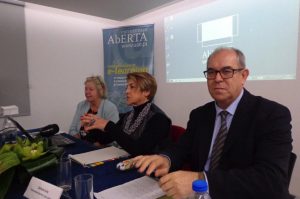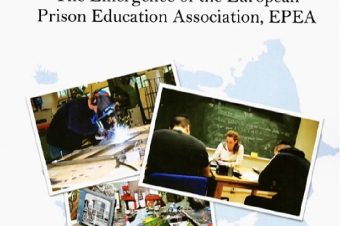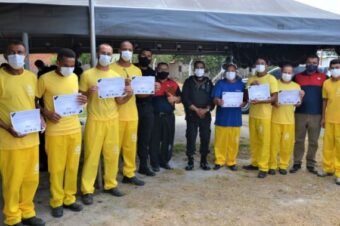November 2018 – Porto, Portugal
On the 6thof November, the city of Porto hosted the first International Seminar on “Education and eLearning in Prisons in Portugal“.
In a combined organisation of the Open University (Universidade Aberta) and the Coimbra’s University Centre for 20thCentury Interdisciplinary Studies (Centro de Estudos Interdisciplinares do Século XX – CEIS20 da Universidade de Coimbra), this Seminar aimed to give voice to several studies that have been carried out within the scope of the educational phenomenon in the prison context.
The presentation of the EducOnline@Pris Digital Campus, a project developed in partnership between Universidade Aberta and the Directorate General for Reintegration and Prison Services (Direção-Geral de Reinserção e Serviços Prisionais – DGRSP), intended to promote Higher Education and Training in prisons in Portugal, marked the programme’s opening.
António Moreira, lecturer and director of the Universidade Aberta – Regional Delegation of Porto and “EaD and eLearning in Prisons in Portugal” Project Coordinator, explained how this project allows the prison population to access Higher Education through secure and limited Internet access.
This pioneering step taken by the Open University in national prisons inspired most of the presentations made at the Seminar. In the words of DGRSP’s Deputy Director General, Isabel Antunes, ‘Education and Training’ play a key role in training and reintegrating people in detention, as this is usually related to dealing with change-averse places and staff having to face multiple challenges. The Education sector and its professionals are also aware of this reality and so far their response has been decisive and positive.
Presentations in the fields of innovation, challenge and citizenship based on a digital culture, and bringing together justice and equity issues have coincided throughout the event, namely from the UK, Spain, Portugal and Brazil, for these form the basis of numerous projects concerning Prison Education (PE) nowadays.

With regard to these, Domingos Caeiro (Vice-Rector of the Universidade Aberta) stated that there is strong agreement that institutions, like the Open University, design projects that open doors for citizens with high levels of vulnerability and, therefore, it is an institutional duty to play an active role in working for more social justice within knowledge societies.
Taking the premises of António Viedma Rojas, from the National Distance Education University (UNED) – Spain, into account, the questions remained whether a student in the prison context is the same as any other; what steps are needed to be taken towards a more effective European Higher Education policy; and how to guarantee the right to Education for all, in a differentiated and inclusive way.
Anne Pike, lecturer at the Open University (UK), alluded to the underlying irony that a protected teaching environment inside a prison means for the student, and also the need to analyse the creation of follow-up units to ensure continuity of studies after a sentence has been served.
In a space and time that is made up of overlapping temporalities, in which a process of dematerialisation could be regarded as a (plausible) solution for the greater good of protecting society, as referred to by Luís Alcoforado, researcher at the CEIS20 Educational Policies, Organisations and Dynamics Group (GRUPOEDE), Regina Branco, Head of the Multidisciplinary Team: Centre for Programme Management and Prison Treatment Activities within the DGRSP, emphasised the need to walk the path slowly (‘step by step’) and safely. However, one should bear in mind that, with the creation of a virtual campus, the possibilities are endless.
As António Moreira pointed out, PE is now (and will continue) focusing on the digital, with its own brand at a technological and pedagogical level, and in a way that it creates a unique, pioneering and innovative digital ecosystem, enabling inmates to learn and develop competences differently from what they were used to.
This reality is also gaining new ground with the creation of the Portuguese Prison Education Association (APEnP), whose interests lie in: promoting Education and Training programmes and related activities in prison establishments in Portugal; stimulating professional development of prison teachers; supporting PE research studies; as highlighted by José Pinto (President) and Armando Loureiro (Member of the Executive Board) during their presentation.
Finally, the work carried out by all present at this 1stInternational Seminar was reflected in the words of an inmate of the Prison Establishment of Porto, during the preview of a documentary, directed by Pedro Branco: “When I am at school, I am rarely imprisoned!”.
For this feeling to have a long-lasting effect in PE, collaborative work among all actors needs to be effective (universities, institutions, prison administrations, prison population, correctional staff, schools, teachers, associations…), so that both academic and social reintegration goals can be, even more, accurately projected.
by José António Moreira
– Lecturer and Director of the Open University – Regional Delegation of Porto
– “EaD and eLearning in Prisons in Portugal” Project Coordinator




